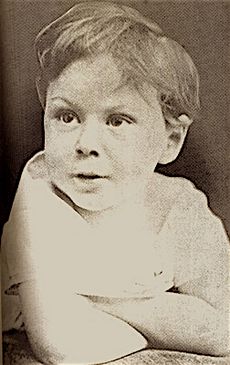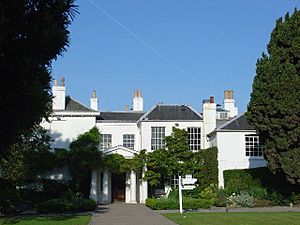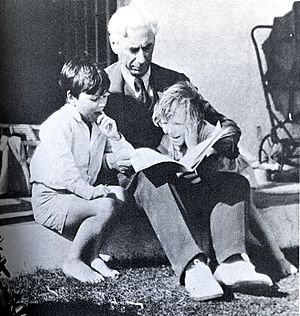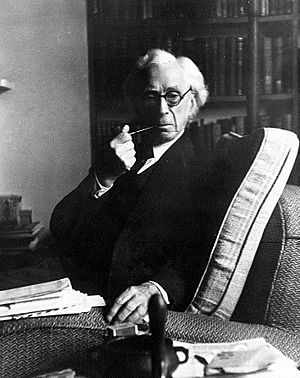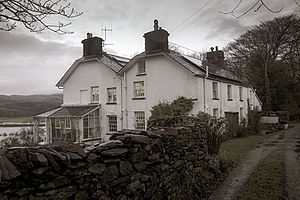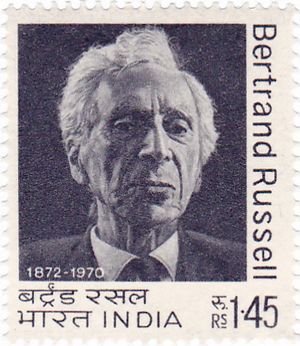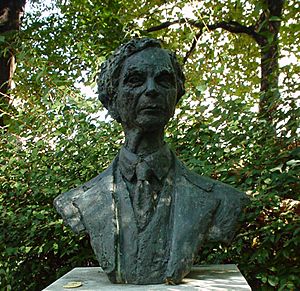Bertrand Russell facts for kids
Quick facts for kids
Bertrand Russell
|
|
|---|---|
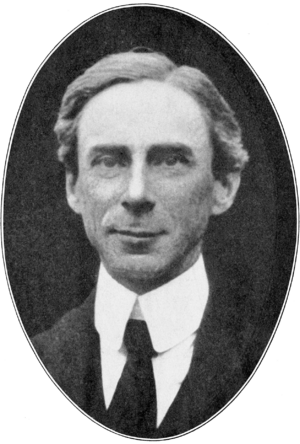 |
|
| Born | 18 May 1872 Trellech, Monmouthshire, UK
|
| Died | 2 February 1970 (aged 97) Penrhyndeudraeth, Wales, UK
|
| Era | 20th century philosophy |
| Region | Western philosophy |
Bertrand Arthur William Russell, 3rd Earl Russell, OM, FRS, (18 May 1872 – 2 February 1970), was one of the world's best-known intellectuals. He was a philosopher, logician, and mathematician. He was born in Wales, but spent most of his life in England. He worked mostly in the 20th century.
Bertrand Russell wrote a lot. He also tried to make philosophy popular. He gave his opinion on many topics. He wrote the essay, "On Denoting", which has been described as one of the most influential essays in philosophy in the 20th Century. He wrote on very serious issues as well as everyday things. Continuing his family's tradition of being involved in politics, he was a well known liberal as well as a socialist and anti-war activist for most of his long life. Millions looked up to Russell as a prophet of the creative and rational life. At the same time, his stances on many topics were extremely controversial.
Born at the height of Britain's economic and political ascendancy, he died of influenza nearly a century later when the British Empire had all but vanished, its power dissipated in two victorious, but debilitating world wars. Russell's voice carried enormous moral authority, even into his early 90s. Russell supported nuclear disarmament a lot, but did not support the American war in Vietnam even when it was popular.
In 1950, Russell was made a Nobel Laureate in Literature "in recognition of his varied and significant writings in which he champions humanitarian ideals and freedom of thought". He died of influenza.
Contents
Biography
Bertrand Arthur William Russell was born at Ravenscroft, Trellech, Monmouthshire, United Kingdom, on 18 May 1872, into an influential and liberal family of the British aristocracy. His parents were John Russell, Viscount Amberley, and Katharine Russell. His paternal grandfather, Lord John Russell, later 1st Earl Russell (1792–1878), had twice been prime minister in the 1840s and 1860s. A member of Parliament since the early 1810s, he met with Napoleon Bonaparte in Elba.
Russell had two siblings: brother Frank (nearly seven years older), and sister Rachel (four years older). In June 1874, Russell's mother died of diphtheria, followed shortly by Rachel's death. In January 1876, his father died of bronchitis after a long period of depression. Frank and Bertrand were placed in the care of staunchly Victorian paternal grandparents, who lived at Pembroke Lodge in Richmond Park. His grandfather, former Prime Minister Earl Russell, died in 1878, and was remembered by Russell as a kindly old man in a wheelchair. His grandmother, the Countess Russell (née Lady Frances Elliot), was the dominant family figure for the rest of Russell's childhood and youth.
The Countess was from a Scottish Presbyterian family and successfully petitioned the Court of Chancery to set aside a provision in Amberley's will requiring the children to be raised as agnostics. Despite her religious conservatism, she held progressive views in other areas (accepting Darwinism and supporting Irish Home Rule), and her influence on Bertrand Russell's outlook on social justice and standing up for principle remained with him throughout his life. Her favourite Bible verse, "Thou shalt not follow a multitude to do evil", became his motto.
Russell's adolescence was lonely. He remarked in his autobiography that his keenest interests in "nature and books and (later) mathematics saved me from complete despondency." He was educated at home by a series of tutors. When Russell was eleven years old, his brother Frank introduced him to the work of Euclid, which he described in his autobiography as "one of the great events of my life, as dazzling as first love".
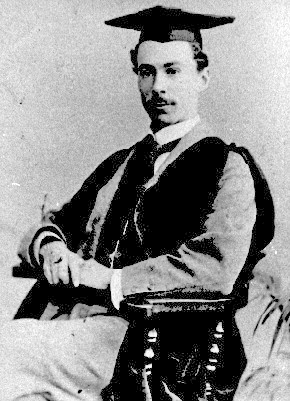
Russell won a scholarship to read for the Mathematical Tripos at Trinity College, Cambridge, and began his studies there in 1890.
Russell taught German social democracy at the London School of Economics.
In 1905, he wrote the essay "On Denoting", which was published in the philosophical journal Mind. Russell was elected a Fellow of the Royal Society (FRS) in 1908. The three-volume Principia Mathematica, written with Whitehead, was published between 1910 and 1913. This, along with the earlier The Principles of Mathematics, soon made Russell world-famous in his field.
In 1910, he became a University of Cambridge lecturer at Trinity College, where he had studied.
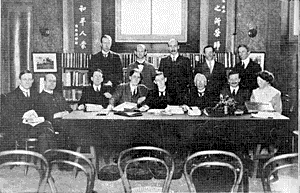
During World War I, Russell was one of the few people to engage in active pacifist activities. In 1916, because of his lack of a Fellowship, he was dismissed from Trinity College following his conviction under the Defence of the Realm Act 1914.
A later conviction for publicly lecturing against inviting the United States to enter the war on the United Kingdom's side resulted in six months' imprisonment in Brixton Prison (see Bertrand Russell's political views) in 1918.
Russell was reinstated to Trinity in 1919, resigned in 1920, was Tarner Lecturer in 1926 and became a Fellow again in 1944 until 1949.
In August 1920, Russell travelled to Soviet Russia as part of an official delegation sent by the British government to investigate the effects of the Russian Revolution. He wrote a four-part series of articles, titled "Soviet Russia—1920", for the magazine The Nation. He met Vladimir Lenin and had an hour-long conversation with him. In his autobiography, he mentions that he found Lenin disappointing, sensing an "impish cruelty" in him and comparing him to "an opinionated professor". He cruised down the Volga on a steamship. His experiences destroyed his previous tentative support for the revolution. He subsequently wrote a book, The Practice and Theory of Bolshevism, about his experiences on this trip.
After the birth of his two children, he became interested in education, especially early childhood education. He was not satisfied with the old traditional education and thought that progressive education also had some flaws; as a result, together with his wife, Dora, Russell founded the experimental Beacon Hill School in 1927. The school was run from a succession of different locations, including its original premises at the Russells' residence, Telegraph House, near Harting, West Sussex. During this time, he published "On Education, Especially in Early Childhood". On 8 July 1930 Dora gave birth to her third child Harriet Ruth. After he left the school in 1932, Dora continued it until 1943.
Russell's and Dora separated in 1932 and finally divorced. On 18 January 1936, Russell married his third wife, an Oxford undergraduate named Patricia ("Peter") Spence, who had been his children's governess since 1930. Russell and Peter had one son, Conrad Sebastian Robert Russell, 5th Earl Russell, who became a prominent historian and one of the leading figures in the Liberal Democrat party.
Before World War II, Russell taught at the University of Chicago, later moving on to Los Angeles to lecture at the UCLA Department of Philosophy. Russell soon joined the Barnes Foundation, lecturing to a varied audience on the history of philosophy; these lectures formed the basis of A History of Western Philosophy.
In the King's Birthday Honours of 9 June 1949, Russell was awarded the Order of Merit, and the following year he was awarded the Nobel Prize in Literature.
In 1952, Russell was divorced by Spence, with whom he had been very unhappy. Russell married his fourth wife, Edith Finch, soon after the divorce, on 15 December 1952. They had known each other since 1925, and Edith had taught English at Bryn Mawr College near Philadelphia, sharing a house for 20 years with Russell's old friend Lucy Donnelly. Edith remained with him until his death, and, by all accounts, their marriage was a happy, close, and loving one.
Russell published his three-volume autobiography in 1967, 1968, and 1969. He made a cameo appearance playing himself in the anti-war Hindi film Aman, by Mohan Kumar, which was released in India in 1967. This was Russell's only appearance in a feature film.
Russell died of influenza, just after 8 pm on 2 February 1970 at his home in Penrhyndeudraeth, aged 97. His body was cremated in Colwyn Bay on 5 February 1970 with five people present. In accordance with his will, there was no religious ceremony but one minute's silence; his ashes were later scattered over the Welsh mountains. Although he was born in Monmouthshire, and died in Penrhyndeudraeth in Wales, Russell identified as English. Later in 1970, on 23 October, his will was published showing he had left an estate valued at £69,423 (equivalent to £0.8 million in 2021). In 1980, a memorial to Russell was commissioned by a committee including the philosopher A. J. Ayer. It consists of a bust of Russell in Red Lion Square in London sculpted by Marcelle Quinton
What people said about Russell
As a man
- "Bertrand Russell would not have wished to be called a saint of any description; but he was a great and good man."
- — A.J. Ayer, Bertrand Russell, NY: Viking Press, 1972.
As a philosopher
- "It is difficult to overstate the extent to which Russell's thought dominated twentieth century analytic philosophy: virtually every strand in its development either originated with him or was transformed by being transmitted through him. Analytic philosophy itself owes its existence more to Russell than to any other philosopher."
- — Nicholas Griffin, The Cambridge Companion to Bertrand Russell, Cambridge: Cambridge University Press, 2003.
As a writer and his place in history
- "Russell's prose has been compared by T.S. Eliot to that of David Hume's. I would rank it higher, for it had more color, juice, and humor. But to be lucid, exciting and profound in the main body of one's work is a combination of virtues given to few philosophers. Bertrand Russell has achieved immortality by his philosophical writings."
- — Sidney Hook, Out of Step, An Unquiet Life in the 20th Century, NY: Carol & Graff, 1988.
- "Russell's books should be bound in two colours, those dealing with mathematical logic in red — and all students of philosophy should read them; those dealing with ethics and politics in blue — and no one should be allowed to read them."
- — Ludwig Wittgenstein quoted in Rush Rhees, Recollections of Wittgenstein, Oxford Paperbacks, 1984.
As a mathematician and logician
- Of the Principia: "...its enduring value was simply a deeper understanding of the central concepts of mathematics and their basic laws and interrelationships. Their total translatability into just elementary logic and a simple familiar two-place predicate, membership, is of itself a philosophical sensation."
- — W.V. Quine, From Stimulus to Science, Cambridge: Harvard University Press, 1995.
As an activist
- "Oh, Bertrand Russell! Oh, Hewlett Johnson! Where, oh where, was your flaming conscience at that time?"
- — Alexandr I. Solzhenitsyn, The Gulag Archipelago, Harper & Row, 1974.
As a recipient of the Nobel Prize for Literature
- In other words, it was specifically not for his incontestably great contributions to philosophy — The Principles of Mathematics, 'On Denoting' and Principia Mathematica — that he was being honoured, but for the later work that his fellow philosophers were unanimous in regarding as inferior.
- — Ray Monk, Bertrand Russell, The Ghost of Madness, p. 332.
From a daughter
- "He was the most fascinating man I have ever known, the only man I ever loved, the greatest man I shall ever meet, the wittiest, the gayest, the most charming. It was a privilege to know him, and I thank God he was my father."
- — Katharine Tait, My Father Bertrand Russell, NY: Harcourt Brace Jovanovich, 1975, p. 202.
Quotations
- "War does not determine who is right. Only who is left." (Often attributed to Russell, but no sources exist.)
- "The secret of happiness is to face the fact that the world is horrible, horrible, horrible." (Source: Alan Wood, Bertrand Russell, the Passionate Sceptic, 1957)
- "The whole problem with the world is that fools and fanatics are always so certain of themselves, but wiser people so full of doubts." (Source?)
- "You could tell by his [Aldous Huxley] conversation which volume of the Encyclopaedia Britannica he'd been reading. One day it would be Alps, Andes and Apennines, and the next it would be the Himalayas and the Hippocratic Oath." (Source: Parris, M., Scorn: With Added Vitriol, London: Penguin, 1996, quoting Russell's 1963 letter to Ronald W. Clark)
See also
 In Spanish: Bertrand Russell para niños
In Spanish: Bertrand Russell para niños


